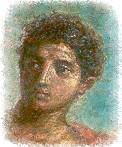
Family:
Born AD41, Rome, Italy, to M. Didius Favonius (aka Geminus) and Junilla Tacita. Plebian rank, father an auctioneer. Brother M. Didius Festus, legio XV Apollinaris, killed AD68, Bethel, Judaea; awarded Palisaded Crown.
Marriage: Helena Justina, d of D. Camillus Verus, senator, and Julia Justa. d Julia Junilla Laeitana, b AD73 Barcino, Hispania Tarraconensis; d Sosia Favonia, b AD75; d Flavia Albia adopted c AD77; s M Didius Alexander Postumus adopted c AD 80.
see Falco Family Tree (PDF file)

Career:
cAD59, legio II Augusta, service in Britain (legion disgraced, AD69); subsequently a speculator, location unknown; discharged on ? medical grounds, cAD66. Active as an informer (delator) in Rome; few details survive. Recorded engagements as imperial agent: Britain, AD71/2 and AD75 (conjectural sightings at Fishbourne Palace and Londinium); Magna Graecia/Campania, AD71; Germania/Germania Libera, AD71; Nabataea/Syria AD72; Baetica/Tarraconensis, AD73; Tripolitania/Cyrenaïca, AD74. Sighting in Greece, AD76, and Egypt, AD77, now thought to have been private visits.
Ascendancy believed to date from AD74, possibly after work on the Great Census, ? due to influence of Antonia Caenis, though she is known to have died in that period. Recorded as holding a procuratorial position at Temple of Juno Moneta, conjecturally identified as associated with the Sacred Geese and Augurs’ Chickens (though this is contested on grounds of improbability). A period of relative prosperity almost certainly followed, when he may have dabbled in literary pursuits and the law. Took up with the Camillus brothers, relatives of his wife; they were subsequently notorious for political intrigue. Under Domitian appears to have owned and run an auction house, with possible retirement from other activities – ? a choice to live in relative obscurity.
Connections:
Vespasian and Titus thought well of Falco and used him for missions requiring discretion; Domitian loathed him, reason unknown. Camillus Verus was a supporter, but had awkward family background. Falco formed friendships with influential members of the Flavian court, notably Julius Frontinus (for whom he worked under cover in Britain) and Rutilius Gallicus with whom he shared an interest in poetry (putative joint recital, AD74 and murky link, ? related to captured Veleda, in late AD77). There are recently identified links with élite informers Paccius Africanus and Silius Italicus, against whom he spoke in the Basilica Julia, in AD76 or 77.
Publications:
(Fragments only) The Spook Who Spoke, a Plautine comedy, tentatively identified as the prototype for Hamlet; known to have been performed in Palmyra in AD72 and recorded in the pinakes of the Great Library at Alexandria; a revised version may have featured in the Roman Games of AD89. A repeat performance, possibly truncated, may have occurred in Rome AD89. Love poems (the Aglaia sequence) have not survived. Contemporaries deemed his Satires his best work, the favourite being a contemplation on parrots addressed to his personal friend L. Petronius Longus. Speech against Paccius Africanus, In re Calpurnia, appears to have been suppressed for political reasons.
